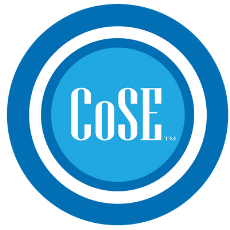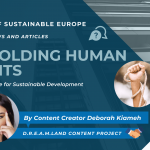Written by Jonas Kepi
Reading time 5 minutes
European Youth and their role in the United Nations
In the vibrant tapestry of global diplomacy, the voices and aspirations of young people have emerged as vibrant threads weaving together visions of progress and unity. Within the European Union (EU), a new generation of leaders is stepping onto the world stage, their youthful vigor and fresh perspectives infusing the United Nations (UN) with a dynamic energy for positive transformation.
The European Union plays a pivotal role within the United Nations, serving as a champion of multilateralism, cooperation, and global solidarity. Since its inception, the EU has been a steadfast advocate for peace, human rights, and sustainable development, aligning closely with the UN’s mission to create a more just and peaceful world. Through collaborative initiatives and diplomatic engagements, the EU continues to shape the UN’s agenda, amplifying the voices of its member states and fostering consensus on critical global issues.
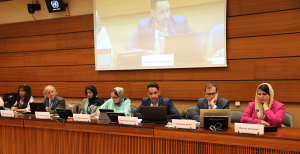
Future Summit – Human Rights Challenges in the Future
Future Summit on Challenges of Human Rights in the Future
On Monday, July 8th 2024 one of our representatives Ramon Rahangmetan was invited as a guest speaker for the second time at the United Nations Office, Palais des Nations in Geneva by joining the Future Summit on Challenges of Human Rights in the Future, this event was organized by the Arab-European Forum, Dialogue on Human Rights. The objectives of this summit were to conclude what challenges related to our common Human Right are ahead of us, why we should be able to tackle these, and what potential solutions may be relevant in order to uphold the Decleration of Human Right Principles set out by the United Nations in December 10th 1948, almost right after World War 2.
The main issue our representative raised was the stagnant decay of Public Trust between citizens and national governments in mainly Western societies. Ramons stated quote; “According to the Organisation for Economic Co-operation and Development – or OECD trust survey; 59% of mainly Western citizens on average do not trust their own government besides 41% that do. The 59% is an increasing number, which isn’t surprising in some countries, this is also due to the reasons why some EU countries are witnessing a sudden ‘right-wing swing’ in votes this year, this, therefore, will automatically affect international influence on national levels in those countries.
Changes in government or leadership can lead to shifts in priorities, affecting the continuity and effectiveness of UN development programs, this is exactly what we’re currently experiencing today, as this year 2024, marks the year with most elections ever recorded in history, a total of 64 countries representing 49% of the world’s population are meant to hold national elections this year. Therefore, international collaborations, influence and trade are put into a new light for some countries. But also, on an individual level for a place in society, thereby, what unites a community or what divides it.”
Public Trust
It’s not hard to understand that continued low-trust environments not only damage social cohesion and political participation, but also limit governments’ ability to function effectively, gain respect from its citizens and how it responds to complex domestic and global challenges. Public trust is a pillar of democracy, participation and collaboration, and therefore, the most important aspect of effective governance, which includes allowing citizens in deciding what is best for society.
More young voices are needed to be able to reclaim or increate public trust. It should not be a question of ‘when’, but a question of ‘how’. For young people eager to engage with the UN and contribute to international diplomacy, a wealth of opportunities and information is readily available. The UN Youth Envoy serves as a vital resource, connecting youth from around the world with initiatives, programs, and platforms within the UN system. Through social media channels, webinars, and interactive forums, young individuals can stay informed about upcoming events, internships within the UN.
besides formally upholding the rights and principles of the UN in forming its main legal building blocks, it’s also important to remind, re-establish and keep rewarding individuals of high personal standards of moral, civic contribution and human decency. These acts of virtue should be cherished even more in modern day society. Supporting ordinary citizens for their outstanding contributions.
As these individual examples often are seen as the cement that keeps these building blocks together. Because without them, you and I – these legal building blocks are useless. What is written on paper, can often differ from reality itself.
To include the future, more action needs to be taken today;
- One of these actions could be to recognize leaders in key industries to organize dialogues with policymakers, public service agents and community workers in order to stimulate cross-sectorial approaches for youth in solving local problems.
- Second a hybrid-approach in formal and non-formal education, which puts more emphasis and focus on the individual’s potential assisting their contribution to planet and people by proactively engaging with it, and make their impact measurable.
- Lastly, more support for national or international programs not just for academic institutions but also civic initiatives or non-profit organizations in order to create an environment of trust for the general public to participate in.
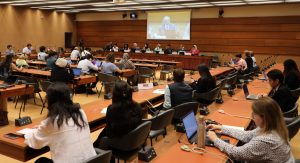
United Nations Palace for Human Rights in Geneva – Room 25 | July 8, 2024
Gateway for Young Leaders
The EU actively promotes youth participation and engagement in global affairs through various programs and initiatives. The European Youth Portal, for instance, serves as a gateway for young Europeans to access information, resources, and opportunities related to education, employment, and civic engagement at both EU and international levels. Also, the Erasmus Plus programme is a very known programme for young people to experience an exchange or training abroad. But also offers scholarships for students to be able to study abroad, while also experiencing Europe in its democratic, diverse and cultural perspectives.
Some young leaders from the EU navigate their paths within the UN, they bring with them a wealth of experiences, perspectives, and ideas according to their field of expertise. Through dialogue, cooperation, and mutual respect, they contribute to shaping inclusive policies and initiatives that reflect the diverse voices and aspirations of youth worldwide. Through their advocacy for sustainable development, human rights, and peace, these diplomats breathe life into the EU’s vision for a more inclusive and equitable world.
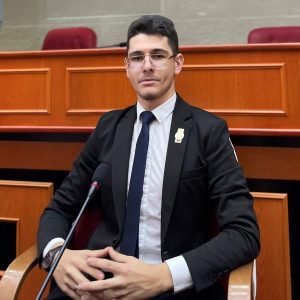 “Jonas is a motivated and passionate individual with experience in various fields, including Diplomacy , Business and marketing. As the founder of Tech Point and a participant in the first edition of Travel Fest, Jonas is always seeking new challenges and opportunities. Board Member, as well as an experienced editor and board member at EU Solidarity Corps and an Official Member of YATA (NATO) International also in Albania. currently the Official member of EYP Albania currently Marketing Specialist at LDA department of Marketing and PR”
“Jonas is a motivated and passionate individual with experience in various fields, including Diplomacy , Business and marketing. As the founder of Tech Point and a participant in the first edition of Travel Fest, Jonas is always seeking new challenges and opportunities. Board Member, as well as an experienced editor and board member at EU Solidarity Corps and an Official Member of YATA (NATO) International also in Albania. currently the Official member of EYP Albania currently Marketing Specialist at LDA department of Marketing and PR”
Sources;
The EU and the United Nations | EEAS (europa.eu)
Key Findings From The 2022 Corruption Perceptions Index | EQS Group
Home – Office of the Secretary-General’s Envoy on Youth (un.org)
European Youth Portal | European Youth Portal (europa.eu)
